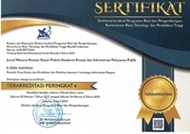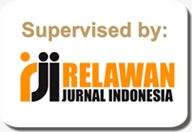Pendorong dan Penghambat Kesuksesan Pelaksanaan Corporate University Di Lembaga Pemerintah Indonesia
Abstract
The literature was analyzed to find the factors that encourage and hinder the implementation of CorpU. The results show a number of factors that encourage and hinder the implementation of CorpU in government institutions in Indonesia. The driving factors are (a) availability of human resources, (b) imitation effect, (c) experience in blended learning, (d) institutional encouragement, and (e) top management support. Meanwhile, the five most important inhibiting factors are (a) weak networks and partnerships, (b) weak infrastructure, (c) lack of innovation, (d) fear of change, and (e) unclear administrative responsibilities. The results of this study can help institutions government to develop CorpU as a HR development strategy in institutions in order to adapt to the rapidly growing knowledge and needs of the human resources they have. In addition, suggestions for further research are given.
Keywords
Full Text:
PDFReferences
Ayuningtias, H. G., Nurbaiti, A., Anggadwita, G., & Kriseka Putri, M. (2016). The Corporate University Landscape in Indonesia. Proceedings of the 3rd International Seminar and Conference on Learning Organization (Isclo-15). 3rd International Seminar and Conference on Learning Organization, Yoyakarta, Indonesia. https://doi.org/10.2991/isclo-15.2016.37
Bakroh, D., & Kusmono. (2019). Learning Impact Measurement by Linking Competency Gap to Performance in the Public Sector (Case Study: MoF, Indonesia). Proceedings of the 1st International Conference on Public Sector Accounting (ICOPSA 2019), 26–29.
Barrow, C. W. (2018). The Entrepreneurial Intellectual in the Corporate University. Springer International Publishing. https://doi.org/10.1007/978-3-319-63052-6
Barus, N. (2021). Transformasi PPSDM Aparatur Perhubungan Menuju Corporate University. Jurnal Ilmiah Edunomika, 5(1), 80–95. https://doi.org/10.29040/jie.v5i1.2037
Bates, A., & Godoń, R. (2017). Tackling knowledge ‘like a business’? Rethinking the modernisation of higher education in Poland. Compare: A Journal of Comparative and International Education, 47(4), 454–467. https://doi.org/10.1080/03057925.2016.1234931
Bretz, K. J. (2017). Indonesia’s One Map Policy: A Critical Look at the Social Implications of a “Mess.” South Carolina Honors College.
Bruny, K. (2007). Corporate Universities in Government. In M. Allen (Ed.), The Next Generation of Corporate Universities: Innovative Approaches for Developing People and Expanding Organizational Capabilities (pp. 235–262). John Wiley & Sons, Ltd.
Cappiello, G., & Pedrini, G. (2017). The performance evaluation of corporate universities. Tertiary Education and Management, 23(3), 304–317. https://doi.org/10.1080/13583883.2017.1329452
Chen, Y., Xu, Y., & Zhai, Q. (2019). The knowledge management functions of corporate university and their evolution: Case studies of two Chinese corporate universities. Journal of Knowledge Management, 23(10), 2086–2112. https://doi.org/10.1108/JKM-04-2018-0228
Chin, T., Yang, Y., Zhang, P., Yu, X., & Cao, L. (2019). Co-creation of Social Innovation: Corporate Universities as Innovative Strategies for Chinese Firms to Engage with Society. Sustainability, 11(5), 1438. https://doi.org/10.3390/su11051438
Choi, J., & Markham, S. (2019). Creating a Corporate Entrepreneurial Ecosystem: The Case of Entrepreneurship Education in the RTP, USA. Journal of Open Innovation: Technology, Market, and Complexity, 5(3), 62. https://doi.org/10.3390/joitmc5030062
Christopher, J. (2012). Tension between the corporate and collegial cultures of Australian public universities: The current status. Critical Perspectives on Accounting, 23(7–8), 556–571. https://doi.org/10.1016/j.cpa.2012.06.001
Cotten, P., & Wyatt-Nichol, H. (2009). Best Practices in Corporate Universities. Maryland State Highway Administration. http://rgdoi.net/10.13140/RG.2.1.1526.9923
Dally, D., Rohayati, Y., & Sinaga, O. (2020). Transformation of Training Institutions Towards Corporate Universities in Indonesia. Journal of Talent Development and Excellence, 12(2), 2.
Dealtry, R. (2000). Establishing a methodology for appraising the strategic potential of the corporate university. Journal of Workplace Learning, 12(5), 9.
Etzkowitz, H., Mack, A., Schaffer, T., Scopa, J., Guo, L., & Pospelova, T. (2020). Innovation by design: SPARK and the Overcoming of Stanford University’s Translational “Valley of Death” in Bio‐Medicine. Managerial and Decision Economics, 41(6), 1113–1125. https://doi.org/10.1002/mde.2966
Ewer, G., & Russ-Eft, D. (2017). Corporate University Theory and Practice: The Case of Platt University, USA. International Journal of Human Resource Development: Practice, Policy & Research, 2(1), 35–49. https://doi.org/10.22324/ijhrdppr.2.104
Faedlulloh, D., Maarif, S., Meutia, I. F., & Yulianti, D. (2020). Birokrasi dan Revolusi Industri 4.0: Mencegah Smart ASN menjadi Mitos dalam Agenda Reformasi Birokrasi Indonesia. Jurnal Borneo Administrator, 16(3), 313–336. https://doi.org/10.24258/jba.v16i3.736
Fauziah, N. M., & Prasetyo, A. W. (2019). ASN Corporate University: Sebuah Konsep Pendidikan dan Pelatihan pada Era Disruptif. Civil Service, 13(2), 51–62.
Febriansyah, H., Welly, I. J., Novani, S., & Labdhagati, H. (2020). The Evolution of Corporate University: Trends and Challenges towards a Super-Smart Society in an Emerging Country. International Journal of Innovation, 13(7), 15.
Firdaus, A. (2017). The Implementation of Corporate University in Public Sector: Case Study Ministry of Finance of Indonesia. Institute of Social Studies.
Freire, P., Dandolini, G., Souza, J., & Silva, S. (2017). Corporative University in Network: Initial considerations towards a new model of corporate education. International Journal of Development Research, 07, 17207–17216.
Fuadi, A. (2020). Analisis Strategi SOAR Balai Diklat Aparatur Kementerian Kelautan dan Perikanan Menuju Corporate University. Jurnal Pendidikan Kewarganegaraan, 7(1), 35–46.
Ghomi, H., & Barzinpour, F. (2018). Identifying the success factors of knowledge management tools in research projects (Case study: A corporate university). Management Science Letters, 805–818. https://doi.org/10.5267/j.msl.2018.6.006
Guilmoto, C. Z., & Jones, G. W. (Eds.). (2016). Contemporary Demographic Transformations in China, India and Indonesia. Springer International Publishing. https://doi.org/10.1007/978-3-319-24783-0
Guntur, M. (2018). Analisis faktor kunci kesuksesan proyek pengembangan sistem informasi pengadministrasian dan angka kredit widyaiswara: Studi kasus Badan Pendidikan dan Pelatihan Keuangan Kementerian Keuangan. Universitas Indonesia.
Ilyas, M. (2017). Making of a Corporate University Model: Transition from Traditional Training to Learning Management System. Journal of Education and Practice, 6.
Kelly, C. M. (2020). A Crisis of Mistaken Identity: The Ethical Insufficiency of the Corporate University Model. Journal of Moral Theology, 9(2), 23–48.
King-White, R., & Beissel, A. (2018). Sport in the Aspirational Corporate University: A Genealogy of Athletic Programming Development at Towson University. Sociology of Sport Journal, 35(4), 334–346. https://doi.org/10.1123/ssj.2018-0100
Lantu, D. C., Labdhagati, H., Razanaufal, M. W., & Sumarli, F. D. (2020). Was the training effective? Evaluation of managers’ behavior after a leader development program in Indonesia’s best corporate university. International Journal of Training Research, 1–16. https://doi.org/10.1080/14480220.2020.1864446
Liu, D., Huang, R., & Wosinski, M. (2017). Smart Learning in Smart Cities. Springer Singapore. https://doi.org/10.1007/978-981-10-4343-7
Lukito, I., & Haryono, H. (2020). Optimalisasi Pendidikan dan Pelatihan Metode E-Learning di Lingkungan Kementerian Hukum dan HAM. Jurnal Ilmiah Kebijakan Hukum, 14(2), 339. https://doi.org/10.30641/kebijakan.2020.V14.339-360
Marpaung, P. M. (2020). Manajemen Organisasi Pembelajar di Institusi Publik. Jurnal Widyaiswara Indonesia, 1(2), 100–107.
Mukhlasin, H., & Budi, I. (2017). Analisis Pengukuran Tingkat Kesiapan Penerapan Manajemen Pengetahuan: Studi Kasus Badan Pendidikan dan Pelatihan Keuangan, Kementerian Keuangan. Jurnal Sistem Informasi, 13(1), 11–20. https://doi.org/10.21609/jsi.v13i1.514
Nurhikmah, N. (2020). Peran Widyaiswara dalam Strategi Pengembangan ASN “Corporate University.” JSEH (Jurnal Sosial Ekonomi dan Humaniora), 6(2), 122–128. https://doi.org/10.29303/jseh.v6i2.86
Pandin, M. (2021). Pembelajaran Investasi CorpU.
Parshakov, P., & Shakina, E. A. (2018). With or without CU: A comparative study of efficiency of European and Russian corporate universities. Journal of Intellectual Capital, 19(1), 96–111. https://doi.org/10.1108/JIC-01-2017-0011
Paton, R. (Ed.). (2005). Handbook of corporate university development: Managing strategic learning initiatives in public and private domains (1st ed). Ashgate Pub.
Patrucco, A. S., Pellizzoni, E., & Buganza, T. (2017). The design process of corporate universities: A stakeholder approach. Journal of Workplace Learning, 29(4), 304–318. https://doi.org/10.1108/JWL-04-2016-0024
Peraturan Pemerintah Nomor 17 Tahun 2020 tentang Perubahan atas Peraturan Pemerintah Nomor 11 Tahun 2017 tentang Manajemen Pegawai Negeri Sipil, (2020).
Phipps, C. (2019). The lived experiences of university tutors in an age of massification. Deakin University.
Pinto Brito, L. M., & Cartaxo de Castro, A. B. (2019). Universidades Corporativas – quando o saber construído pela humanidade é substituído pelo conhecimento empresarial. Innovar, 29(72), 147–162. https://doi.org/10.15446/innovar.v29n72.77939
Prochniewski, K. (2014). Filling a Need: Strategic training for frontline clerk’s office staff. National Center for State Courts.
Rachman, N. M. (2019). Analisis Strategi Pusat Pendidikan dan Pelatihan Perdagangan Menuju Corporate University. Jurnal Cendekia Niaga, 3(2), 8–28.
Rachman, N. M., & Hidayati, R. (2020). Mewujudkan SDM Unggul di Bidang Perdagangan melalui Corporate University. Cendekia Niaga, 4(1), 1–7.
Razanaufal, M. W., & Lantu, D. C. (2019). Evaluation of Leadership Training Program Using Kirkpatrick Model Case Study in Telkom Corporate University. Research Journal of Finance and Accounting, 10(4), 119–131. https://doi.org/10.7176/RJFA/10-4-14
Scarso, E. (2017). Corporate universities as knowledge management tools. VINE Journal of Information and Knowledge Management Systems, 47(4), 538–554. https://doi.org/10.1108/VJIKMS-12-2016-0074
Schultz, D. (2019). Yogi Berra and the art of public affairs teaching. Journal of Public Affairs Education, 25(1), 18–22. https://doi.org/10.1080/15236803.2018.1558827
Singh, V., Verma, S., & Chaurasia, S. S. (2020). Mapping the themes and intellectual structure of corporate university: Co-citation and cluster analyses. Scientometrics, 122(3), 1275–1302. https://doi.org/10.1007/s11192-019-03328-0
Stevens, K. E. (2000). Implementing corporate universities in the public sector: Evaluating Clark County’s supervisor’s organizational skills program [University of Nevada]. https://digitalscholarship.unlv.edu/thesesdissertations/525
Sugiri, D., & Pratama, A. A. (2020). Aktivitas Pembentuk Biaya Layanan Pembelajaran Jarak Jauh (PJJ) Sebagai Dampak Pandemi Covid-19. Jurnal Edumaspul, 4(2), 19–24.
Tabares, S. (2020). Insights from corporate social innovation: A research agenda. Social Enterprise Journal, 16(3), 317–338. https://doi.org/10.1108/SEJ-08-2019-0057
Tahir, B. (2021). Milestone Awal BPSDM Provinsi Sulawesi Selatan Menuju Corporate University. Jurnal Pendidikan Indonesia, 2(2), 194–201. https://doi.org/10.36418/japendi.v2i2.105
Wahyudi, H. (2021a). CorpU Instansional, Saat Ini dan Akan Datang.
Wahyudi, H. (2021b). The New Direction of Competency Development Policy for the State Civil Apparatus during the New Normal Era in Indonesia. Italienisch, 11(1), 110–120.
Widyastika, Y. (2020). Kesiapan Lembaga Pelatihan Pemerintah Menjadi Corporate University (Studi Kasus di Pusat Pendidikan dan Pelatihan Sumber Daya Manusia Ketenagakerjaan). Jurnal Bina Ketenagakerjaan, 1(1), 65–83.
Williams, K. (2019). Exploring the strategies change leaders need to overcome change resistance in organizational transformations. Colorado Technical University.
Yuniarto, A., Hubeis, A. V., & Sukmawati, A. (2019). Faktor-Faktor Kunci Kesuksesan Implementasi Corporate University dalam Rangka Transformasi Badan Pendidikan dan Pelatihan Keuangan. Jurnal Aplikasi Bisnis dan Manajemen, 5(3), 466–477. https://doi.org/10.17358/jabm.5.3.466
DOI: http://dx.doi.org/10.31845/jwk.v25i1.723
Refbacks
- There are currently no refbacks.
Copyright (c) 2022 Asih Setiawati

This work is licensed under a Creative Commons Attribution-NonCommercial-ShareAlike 4.0 International License.
JURNAL WACANA KINERJA INDEXED BY:
__________________________________________________________________________________________________________
@2023 Center fo State Civil Apparatus Training and Development and Competency Mapping (Pusat Pelatihan dan Pengembangan dan Pemetaan Kompetensi Aparatur Sipil Negara Lembaga Administrasi Negara - Puslatbang PKASN LAN) Jl. Kiara Payung KM. 4, 7 Jatinangor, Sumedang, Jawa Barat 45366 Telp. (022) 7790048-7790044-7790049-7782041-7782042 Fax. (022) 7790055-7782178; Email: wacanakinerja@yahoo.com; wacanakinerja@gmail.com
Powered by OJS
















